External Activities
2024
Annual Meeting of the Population Association for AmericaFrom 17 to 19 April 2024, several CFPR research affiliates attended the annual meeting of the Population Association for America (PAA), one of the world’s premier conferences for the population research community. The conference was held in Columbus, Ohio, USA. CFPR researchers including Dr. Kriti Vikram, Dr. Mu Zheng and Dr. Senhu Wang presented their work on a range of research topics such as internal migration intentions in China cities, child marriages in India and childlessness in Singapore. |
 |
Projections/Analyses of Households and Living Arrangements and Applications in Healthy Aging and Sustainable Development PracticesCFPR co-organised the international conference, at Peking University during 9-11 May 2024, led by A/P Feng Qiushi. Other co-organisers of the event included the National School of Development at Peking University, China Population and Development Research Center, and Zhejiang Urban Governance Studies Center. Several CFPR researchers participated in the conference, including A/P Bussarawan Teerawichitchainan, Dr. Tan Poh Lin, research associate Sun Yi, research assistant Cai Zuqi, and PhD students Mo Yan and Liu Yuanying. |
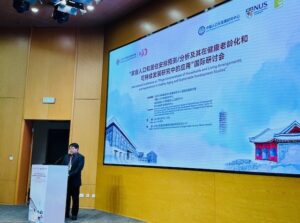 |
2023
Expert Group Meeting on Demographic Changes and Ageing of Population in Asia
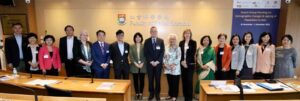
From 30 November to 1 December 2023, CFPR Co-Director A/Prof Bussarawan Teerawichitchainan co-organised an Expert Group Meeting on “Demographic Changes and Ageing of Population in Asia” with the Consortium of Institutes on Family in the Asian Region (CIFA), the University of Hong Kong (HKU), and United Nations Department of Economic and Social Affairs (UNDESA). The meeting was held at HKU Faculty of Social Sciences. The meeting brought together experts across Asia-Pacific, including CFPR Founding Director Prof Jean Yeung, to discuss issues pertaining to population ageing, with a view to analyze the impact of ageing on families. The meeting also aimed to consolidate recommendations for family policy development in preparation for the 30th anniversary of the United Nations International Year of the Family in 2024.
2022
Forum on Population Research Priorities in Singapore
On 31 March 2022, CFPR and the Population Association of Singapore (PAS) collaborated to organise this Forum to identify and discuss several of Singapore’s most pressing population issues. Adopting a hybrid meeting format, it featured six distinguished speakers: Ms Cindy Khoo, Deputy Secretary of Strategy Group at the Prime Minister's Office; Prof Paul Cheung, Director of Asia Competitiveness Institute and Professor in Practice at the NUS Lee Kuan Yew School of Public Policy; A/Prof Premchand Dommaraju from the Department of Sociology at Nanyang Technological University; Dr Chan-Hoong Leong, Head of Policy Development, Evaluation and Data Analytics at Kantar Public; Assoc Prof Jessica Pan, Dean's Chair at the NUS FASS Department of Economics, NUS; and A/Prof Bussarawan Teerawichitchainan, Department of Sociology and Anthropology, NUS and the Co-Director of CFPR, NUS. The event was moderated by CFPR Founding Director Prof Jean Yeung.
2021
ARI20 Anniversary Roundtable SeriesThe Asia Research Institute (ARI), the Changing Family in Asia cluster will be holding an online conference from 14-15 October 2021 via Zoom, to celebrate its 20th anniversary. This two-day conference will have six panels of cluster alumni presentations on different themes of the changing families in Asian countries like China, Hong Kong, Malaysia, Philippines, South Korea, Thailand and Taiwan. CFPR Founding Director Prof Jean Yeung and Co-Director A/P Bussarawan Teerawichitchainan will also be presenting at this roundtable. |
 |
Global Forum of Computing Social ScienceThis forum is jointly organised on 23-25 August 2021 by the Faculty of Arts and Social Science (FASS) and the Department of Information Systems and Analytics (DISA) within the School of Computing, NUS. CFPR Deputy Director A/P Feng Qiushi is one of the key organisers of this forum. Through this forum, the organisers aim to promote the advancement of this exciting inter-disciplinary field in Singapore and Asia. CFPR Co-Director A/P Vincent Chua will be presenting on “Finding vs. Being Found: Unequal Network Pathways to Jobs among Young Adults” together with A/Prof Irene Ng CFPR Co-Director A/P Bussarawan Teerawichitchainan will be presenting on “Family Roles in Caring for Older Persons with Long-term Care Needs in China and Thailand” |
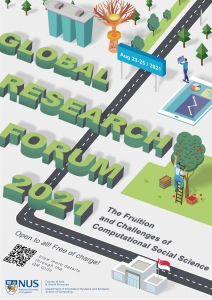 |
Harvard Singapore Foundation Social Capital Lecture SeriesOn 18 August 2021, Professor Christos Makridis presented the HSF lecture on Social Capital. A/P Vincent Chua moderated the session. The presentation emphasized the importance of how social capital promotes economic and human flourishing, particularly as the digital economy expands and more work is done remotely, rather than face-to-face. |
|
Leisure for Older Adults in AsiaThe international conference was organised by Asia Research Institute, NUS, from 19-20 January 2021. The conference explored the question of how older people can find sources of well-being and meaning, and create fulfilling lifestyles and identities. CFPR’s Founding Director Professor Wei-Jun Jean Yeung and our Research Associate A/P Thang Leng Leng were conference convenors together with Dr Benny Tong. |
 |
2020
International Conference on " The Economic and Social Impacts of Population Ageing: China in a Global Perspective "On 30 November to 3 December 2020, co-organised by East Asian Institute, NUS, the conference explored how China’s quest for modernisation plays out amidst rapid population ageing, how economic and social innovations come about, how life courses are re-organised and how ageing norms are re-formulated. CFPR’s Founding and Deputy Directors, Professor Wei-Jun Jean Yeung and A/Prof Feng Qiushi presented in this conference. |
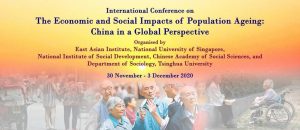 |
Singapore Research Nexus Virtual EventOn 26 November 2020, CFPR's Co-Director A/P Vincent Chua presented on elite schools and neighbourhoods in Singapore (Getting Ahead in Singapore: How Neighbourhoods, Gender, and Ethnicity Affect Enrollment into Elite Schools?) during the panel session "Pedagogy, Education and Development", alongside other panellists from NUS: Dr Lee Li Neng (Chair ), A/P Chris McMorran and Dr Kamalini Ramdas. |
 |
Emerging Dimensions of Marriage in AsiaOn 19-20 November 2020, the E-conference was organised by Asia Research Institute via Zoom, bringing together scholars from multiple disciplines to broaden our understanding of the rapidly changing patterns and issues related to marriage in the different regions of Asia. Prof Jean Yeung was one of the conference convenors and speakers. A/P Bussarawan (Puk) Teerawichitchainan, Dr Kriti Vikram, Dr Mu Zheng and our PhD Research Scholar Shuya Lu were part of a distinguished list of panellists. |
|
Managing DemographicChangein Southeast Asia: Challenges and Issues amidst the "New Normal"On 19-20 November 2020, the [online] workshop organised by the Institute of Southeast Asian Studies (ISEAS) and supported by Konrad Adenauer Stiftung, addressed the well-known demographic phenomenon of ageing societies. A/P Bussarawan (Puk) Teerawichitchainan was one of the panellists in this workshop. She presented on “Measuring Productive Aging in Southeast Asia: Some Reflections from Comparative Analyses of Myanmar, Vietnam, and Thailand”. |
 |
Understanding and Supporting Low-Income Families during COVID-19 and its AftermathOn 18 November 2020, the webinar was held as part of the NUS Giving Webinar Series organised by the NUS Development Office. Prof Jean Yeung was one of the distinguished speakers for the webinar. Together with the other panellists, she discussed the challenges low-income families face during these difficult times and the impact of COVID-19 pandemic and its aftermath. |
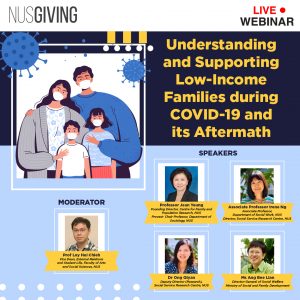 |
GSA 2020 Annual Scientific MeetingFrom 4-7 November 2020, the GSA 2020 Annual Scientific Meeting was organised online by the Gerontological Society of America. The meeting brought together researchers, educators, scientists, health care professionals and industry experts to address the most pressing issues in the field of aging. In this year’s meeting, A/P Bussarawan (Puk) Teerawichitchainan presented on the “expansion of Thailand’s social pension policy and its implications for family support for older persons”. |
|
Global Family Change, Demographic Challenges, and Human DevelopmentOn 29 October 2020, Prof Jean Yeung gave a live talk on "Global Family Change, Demographic Challenges, and Human Development" at the NUS PhD eOpen Day Forum. She shared her research on demographic challenges, human development and social inequality, noting the inequalities by socioeconomic status, gender, age, and race. She also discussed results from the SG LEADS project on early childhood development. |
 |
Going Solo in China: Trends in the Next Three DecadesOn 23 October 2020, Prof Jean Yeung gave a talk on the prevalence and characteristics of those who will live alone in China in the next three decades based on projections using the ProFamy Extended Cohort-component Method. |
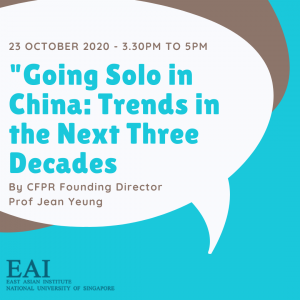 |
Growing Up in Singapore: Early Childhood Development & Implications of COVID-19The webinar on 16 October 2020 was part of the CASER Research Seminar Series organised by NYU Shanghai. Prof Jean Yeung discussed some results of the SG LEADS project focusing attention on children’s time diaries and the Woodcock-Johnson achievement tests. |
 |
Productive Longevity WorkshopCFPR affiliates Prof Jean Yeung, A/P Bussarawan (Puk) Teerawichitchainan, A/P Feng Qiushi, A/P Thang Leng Leng, A/P Roger Ho, and Dr Yi Huso were speakers in the 2-day online workshop organised by the proposed Centre for Productive Longevity, NUS. The workshop was held virtually from 22-23 September 2020. |
|
The 100 Year Lives in Asia Conversations SeriesThe University of Chicago Francis and Rose Yuen Campus in Hong Kong organized the 100 Year Lives in Asia Conversations Series. The episodes explore a variety of topics to address the changing needs of people and their families as they prepare to live longer lives, and also on challenges and opportunities that lie ahead of them. CFPR's Co-director Associate Professor Bussarawan (Puk) Teerawichitchainan served as a panellist for the episode on ‘Responsibilities Across Generations” on 2nd July 2020. She discussed the implications of demographic transitions for continuity and change in intergenerational support systems in Southeast Asian societies. |
 |
Asia Thinker Series Virtual PanelThe Asia Thinker Series is organized by Lee Kuan Yew School of Public Policy, NUS. The virtual panel of #AsiaThinkerSeries was held over Facebook Live on 21 May 2020. The panel explored the question “Will the Pandemic Make or Break the Family?” CFPR’s Founding Director Professor Wei-Jun Jean Yeung was one of the experts on this panel. The moderator for the panel was CFPR’s Research Associate Assistant Professor Tan Poh Lin. Prof Yeung discussed the uneven impact on different types of families and how this pandemic has revealed where the weak points are in the society. |
 |
2019
China International Forum of Elderly HealthThe China International Forum of Elderly Health is a national research forum of China and is organized by China National Committee of Aging, which is the top government agency on Aging issues in China. In 2019, the forum was held from 15 to 17 Nov at Zhuhai, Guangdong with one main forum and three sub-forums, and with invited scholars from Australia, Denmark, Japan, and Singapore. CFPR's Deputy Director Associate Professor Feng Qiushi was invited to give a speech at the forum of "Promoting Active Aging" and his talk is titled as “New Insights of Social Gerontology and Promotion of Active Aging”. |
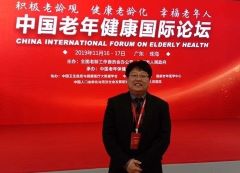 |
Intergenerational Paths to Self-Sufficiency WorkshopThe Intergenerational Paths to Self-Sufficiency Workshop was held from 28 to 29 November 2019 at the University of Melbourne, Australia and brought together approximately 50 academics and policymakers whose work addresses the causes and mechanisms underlying intergenerational disadvantage and discuss the latest evidence and gaps in relation to the persistence of intergenerational disadvantage. CFPR's Co-Director Professor Wei-Jun Jean Yeung was invited to be one of the keynote speakers for this workshop and she gave a speech on the "Pathways of the Intergenerational Transmission of (Dis)advantages: Linked Lives and Cumulative Inequality" at the workshop. |
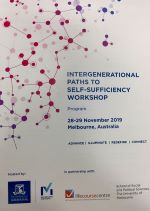 |
Qatar Population Day 2019 - Population Policy between Reality and HopeCFPR's Founding Director Professor Wei-Jun Jean Yeung was invited to give a keynote speech for the Qatar Population Day in Doha. The event was organized on 22nd October 2019 by Qatar Permanent Population Committee and United Nations Fund for Population(UNFPA). Her address was titled “Singapore’s Inclusive Family-oriented Population Policies and Sustainable Development Goals". |
 |
RC06 International Sociological Association MeetingProfessor Charles Hirschman (University of Washington) who was the former chairperson of CFPR advisory board gave a keynote address titled "Asian Family Structure: Past, Present, and Future" at the RC06 International Sociological Association meeting in Hanoi, Vietnam last week. Other current and past CFPR research affiliates also presented their work at this international conference attended by more than 180 participants from 25 countries. |
 |
The Second Asian Population ForumProfessor Wei-Jun Jean Yeung and Associate Professor Feng Qiushi attended The Second Asian Population Forum in Shanghai, China during 11-12 October 2019. They presented on “Who will live alone in China? One-person Households in China, 2010 to 2050.” They found that about 87 million people live alone today in China and by 2050, this number will increase to 125 million. This means one in five of all households will have only one person living in there. The largest solo-living subgroup will be urban young and middle-aged adults, especially those young males, who are not married and highly educated, many with a college degree. Vulnerable groups include the widowed females, the rural youth migrants, and those who are not married, do not have children and have low socioeconomic status. |
 |
Cognitive Psychology Section and Developmental Psychology Section Joint Conference 2019The Cognitive Psychology Section and Developmental Psychology Section Joint Conference 2019 was organised by the British Psychological Society, and at the conference which was held from 4 to 6 September, Dr Chen Luxi presented two papers on (1) Economic hardship and early childhood academic achievement: The roles of parenting, cognitive function and delay of gratification; and (2) Does the delay of gratification moderate the relationship between economic hardship and young children’s behaviours? The pathways through which childhood poverty might adversely affect young children’s academic performance and behavioural development were discussed, by investigating the mediating processes such as parental emotional and cognitive status, parenting practices and children’s self-regulation. |
 |
Retirement and Re-employment in Singapore Conference2nd of July 2019 saw CFPR's Co-Director, Professor Wei-Jun Jean Yeung speak alongside Manpower Minister, Josephine Teo, Mercer CEO Peta Latimer, Prudential’s Chief Human Resource Officer Sheela Parakkal and British Chambers of Commerce Singapore President Dr Bicky Bhangu at the British Chamber of Commerce Singapore event: ‘Minister Josephine Teo on Retirement and Re-employment in Singapore’.The event was held in the Prudential Tower with CFPR Deputy Director, A/P Feng Quishi in attendance. The panel debated on the retirement and re-employment of older workers, hot button issues which Singapore is grappling with as it looks to raise the retirement age to beyond 62 and re-employment age to beyond 67. Mr Lee Pak Sing, Divisional Director of Workplace Policy and Strategy Division from the Ministry of Manpower shared the rationale of Singapore government behind tripartite workgroup’s consensus to increase the retirement age and re-employment age. Singapore is grappling with a stagnating working-age population, an expanding senior population and high life expectancy. This has resulted in a larger number of older adults being employed. Thus, it is important for government, corporates and communities to work together on adapting to these changes. Therefore, MOM will be introducing various incentives, practices and programs that encourage the private sector to hire and improve the employability of senior workers. Following this revelation, Professor Yeung shared research findings on the retirement age policy in China which were relevant to Singapore. To begin with, extending the retirement age will reduce the retiree/worker ratio and result in the longer retention of a more educated, healthier workforce with older female workers seeing the biggest increase. In addition, said extension allows aged individuals the opportunity to stay longer in paid employment thereby remaining socially active which could reduce social exclusion. Such engagement has been shown to provide physiological and psychological benefits to older adults. |
 |
Asia-Pacific Workshop on Developing Tools to Measure Inclusive and Active Population Ageing WorkshopCFPR's Co-Director Associate Professor Bussarawan Teerawichitchainan was invited to share her expertise on measuring productive ageing in Southeast Asia at the Asia-Pacific workshop on developing tools to measure inclusive and active population ageing. The workshop is co-organized in Bangkok, Thailand during 27-28 June 2019 by the United Nations ESCAP (Economic and Social Commission for Asia and the Pacific) and HelpAge International. The workshop was attended by government officials and national professionals (demographers, economists, and statisticians) involved in policy monitoring related to population ageing. |
 |
How do we get Singaporeans ready for 100? Pru-Impact Panel DiscussionCFPR's Co-Director Professor Wei-Jun Jean Yeung spoke at the panel discussion: "Productive Aging and Long-term Care: How do we get Singaporeans ready for 100?". Accompanying her was Mr Tan Chuan-Jin, Speaker of Parliament, Mr Wilfred Blackburn, Prudential Singapore CEO and Ms Peh Kim Choo, Tsao Foundation CEO. The discussion was held in conjunction with Pru-Impact Week, 14th to 17th May 2019. The main talking points were preventive health, healthcare sustainability and the creation of volunteer networks for the aged via public-private partnerships. Reduced social isolation amongst the aged was also mentioned. |
 |
International Conference on Household and Living Arrangement Projections for Informed Decision-MakingCFPR's Deputy Director Associate Professor Feng Qiushi attended the International Conference on Household and Living Arrangement Projections for Informed Decision-Making in Beijing, China from the 9 to 11th of May 2019. This conference was sponsored by Department of Management Science of National Natural Science Foundation of China (NSFC) and UNFPA China Office, and jointly organized by China Population and Development Research Center, (CPDRC) Center for Healthy Aging and Development Study and Raissun Institute for Advanced Studies at National School of Development, Peking University, Centre for Family and Population Research (CFPR) at the National University of Singapore, and Center for Households and Consumption Forecasting of Digital China Health. The conference’s main aim was to promote the methodological advancement and application of projecting household and living arrangement and to establish an international network for collaborative research. On CFPR’s behalf, Associate Professor Feng Qiushi gave one of the opening remarks highlighting the importance of household projections in Asia and made a presentation on the future trends of Chinese solo-living household and its implications on sustainable development. |
 |
Trends, Challenges, and Research on Elderly Care in Asia. 60th Anniversary meeting, Taiwan Population AssociationThe 60th Anniversary was held in Taiwan from 19-20th April 2019. CFPR's Founding Director Professor We-Jun Jean Yeung attended this Anniversary and delivered a keynote speech on how the experiences in ageing in Asian countries differ from the West in socioeconomic, cultural and policy contexts. She discussed challenges and policy innovations in Asia focusing on long-term care (LTC) needs and provision and touched on "productive ageing" literature amongst other things. |
|
Hong Kong Baptist University Talk: Pay offs to Gender and Ethnic Social Capital in the Singaporean MeritocracyCFPR's Co-Director Associate Professor Vincent Chua presented his recent research on how labour markets contexts in Singapore influence the payoffs of workers from different groups on 29th of March 2019. This study identifies two gaps in the literature on social capital: First, the over-emphasis on class-based measures overshadows other equally important forms of stratification, for example, gender and ethnicity. Second, we underscore the ever-increasing need for contextualization-by studying how variations in labour markets characteristics have produced unequal social capital payoffs for different groups of workers. Analyzing a representative dataset of Singaporeans-based on N=3,000 collected in 2016-our findings show that ties to university graduates who are Chinese, Indians or Others are associated with greater payoffs than ties to university graduates who are Malays. Moreover, these payoffs to ethnic social capitals are observed only in the private sector-not in the public sector-suggesting that meritocratic characteristics (most clearly seen in the public sector) have suppressed the role and value of social capital. |
|

